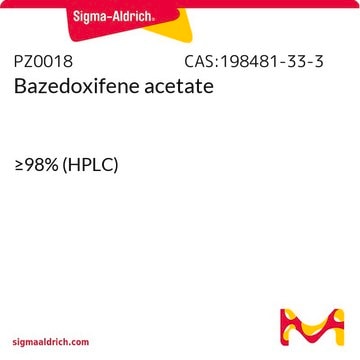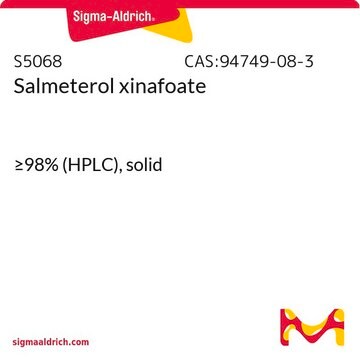SML0763
SC144 hydrochloride
≥98% (HPLC)
Sinónimos:
2-(7-Fluoropyrrolo[1,2-a]quinoxalin-4-yl)hydrazide-2-pyrazinecarboxylic acid hydrochloride
About This Item
Productos recomendados
Quality Level
assay
≥98% (HPLC)
form
powder
storage condition
desiccated
color
white to light brown
solubility
DMSO: 5 mg/mL, clear (warmed)
storage temp.
−20°C
SMILES string
Fc1cc2c(cc1)[n]3c(ccc3)C(=NNC(=O)c4nccnc4)N2.Cl
InChI
1S/C16H11FN6O.ClH/c17-10-3-4-13-11(8-10)20-15(14-2-1-7-23(13)14)21-22-16(24)12-9-18-5-6-19-12;/h1-9H,(H,20,21)(H,22,24);1H
InChI key
LKFGGXYXFIICED-UHFFFAOYSA-N
Application
- as a glycoprotein 130 (gp130) inhibitor to evaluate the effect of bazedoxifene on interleukin (IL-6) mediated cell viability in pancreatic cancer cells
- as a gp130 inhibitor to study its effects on signal transducer and activator of transcription 3 (STAT3) activation in mesenchymal precursor cells (KMM) cells
- as an interleukin 6 signal transducer (IL-6ST) inhibitor in media to test its ability to block serum-induced migration/invasion
Biochem/physiol Actions
Storage Class
11 - Combustible Solids
wgk_germany
WGK 3
flash_point_f
Not applicable
flash_point_c
Not applicable
Elija entre una de las versiones más recientes:
Certificados de análisis (COA)
¿No ve la versión correcta?
Si necesita una versión concreta, puede buscar un certificado específico por el número de lote.
¿Ya tiene este producto?
Encuentre la documentación para los productos que ha comprado recientemente en la Biblioteca de documentos.
Nuestro equipo de científicos tiene experiencia en todas las áreas de investigación: Ciencias de la vida, Ciencia de los materiales, Síntesis química, Cromatografía, Analítica y muchas otras.
Póngase en contacto con el Servicio técnico








